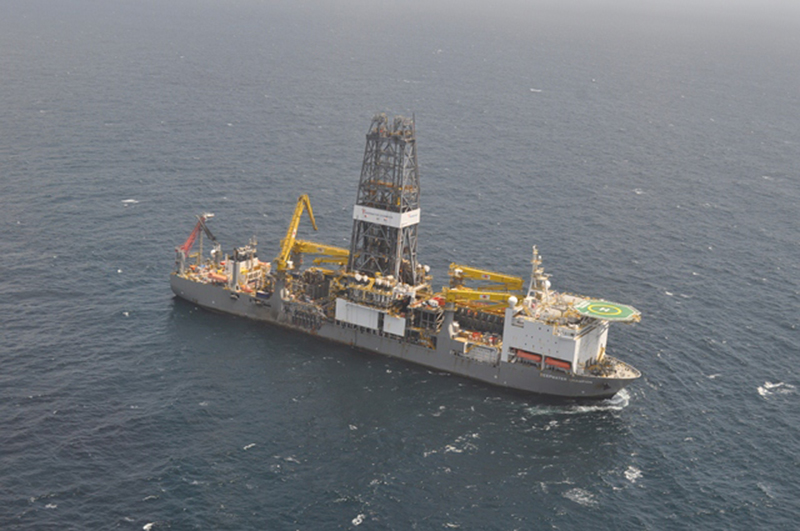The IHS Markit audit of oil expenditure by ExxonMobil’s subsidiary, Esso Exploration & Production Guyana Limited (EEPGL) has revealed that not only did it procure the services for the Transocean-owned Deepwater Champion drill ship way above costs for similar vessels available but that the company had submitted US$500,000 for seismic works prior to 2008 and had no supporting documents for it.
Checks with the Guyana Geology and Mines Commission (GGMC) which was then responsible for the oil and gas sector also showed no record of seismic activity from the company for period claimed.
“Neither EEPGL nor GGMC provided any records of seismic activity prior to 2008, and EEPGL provided no other evidence for the expenditure amounting to [US]$500,000 of seismic related costs that was incurred in 2000/01. The Audit Team recommends that this amount be removed from the Cost Bank,” the audit report stated.
The report also said that the overall geoscience technical costs recorded directly in the General Ledger towards Seismic and Other Data Acquisition lack transparency. These transactions have been reviewed via the Intercompany analysis and are predominantly for time writing for Affiliate Company Employees.
Why the company submitted claims for activities it has no documentation for is still unclear as ExxonMobil is still to publicly respond to the findings of the audit.
The British auditing firm, in a report submitted to the PPP/C government in March, 2021, made startling revelations including that 12.8% of the US$1.67 billion expense claims made by EEPGL for the period 1999 to 2017 could be disputed and that none of the companies complied with the all-important insurance requirements.
There is also a series of recommendations by the auditing firm to government to tighten the gaps and obtain better insight and oversight of the companies’ operations here.
While never released by the PPP/C government, this newspaper carried details from the report in the last Sunday Stabroek, Monday’s and yesterday’s editions.
Government, ExxonMobil which is the operator, its partners CNOOC and Hess, the Guyana Geology and Mines Commission, and the Guyana Revenue Authority, all participated in the audit.
In this newspaper’s first report, it was highlighted that contract procurement for the Deepwater Champion drill ship was also flagged for inadequate supporting documents with a US$15 million figure attached to it.
`Petrodata’
IHS Markit explained that it uses its known ‘Petrodata’ service to track the global rig and vessel market. From its detailed assessment and comparisons globally it said that the contract to procure the services from the Deep Water Champion was not only single-sourced but it was done at a higher than global rate. “Deepwater Champion was contracted at a rate higher than the market, US$15,082,260 should be removed from the Cost Bank,” the report stated.
Important to note is that up to the period audited, there was no local content legislation and the Center for Local Business Development only started in 2017, with the aim of giving local businesses and employees support in developing their skills, knowledge, and abilities, to tap into the many opportunities that the then burgeoning sector would bring.
Focussing on procurement where auditors looked at contracts entered into, the report singled out the sole-sourcing of some contracts. For the single-source contracts, it asserts, those are justified by benchmarking or discussions with category experts. The audit also said that although single-source contracts don’t go through a competitive bidding process, the same QC (quality control) process is applied regarding technical, commercial, operational and financial qualifications.
“Looking at contracts, as per the PSA (Production Sharing Agreement), Section 3.1(d) (i): The actual costs of contracts for technical and other services entered into by the Contractor for the Petroleum Operations, made with third parties are cost recoverable; provided that the prices paid by the Contractor are competitive with those generally charged by other international or domestic suppliers for comparable work and services,” the report said.
However, the PSA does not outline the definition of “competitive” that could signify either competitive tendering or solid justification that the prices obtained for services are competitive. Generally competitive pricing is a pricing strategy in which the competitors’ prices are taken into consideration when purchasing a product or a service.
And cost recoverability for procurement is specific to the PSA as it contains specific provisions regarding the procurement process and valuation of Services and Materials.
Other costs or expenses not dealt with in Section 3 of the PSA are recoverable subject to approval of the Minister. All single-source contracts that do not go through the competitive tendering process are cost recoverable subject to approval of the Minister.
Review of documentation
The report explained that the audit review process for procurement involved the review of documentation to determine the competitive valuation of services and materials procured. For selected contracts, the audit team reviewed the following documents: Procurement Strategy, Technical, and Commercial Evaluation Plan (Including Scoring Methodology).
And turning to vendor spend by ExxonMobil, the report said that a total of US$1,067 million is attributable to vendor spend over the contract period, and of this total procurement, details for US$953 million or 89% of this amount were analyzed by the procurement process.
During the period of the accounts audit, the report said that US$240 million single-source awards observed showed that that US$100 million had limited benchmark or comparative data available to demonstrate competitiveness of the rates agreed to in the contract. For the remaining US$140 million or 58% of the total, reference data was available for contracted rates, and it was here the Deepwater Champion contract was highlighted.
“The largest contributor to the value of single sourced expenditure which does not demonstrate competitive pricing is related to the Deepwater Champion drillship which was contracted from Triton/Transocean at a day rate of [US]$707,620/day; with total contract spend amounting to [US]$87 million. Not considering ancillary service charges, 87 million divided by a day rate of $707,620/day results in payment for 123 days. Given the upper quartile of the prevailing market rate was [US]$585,000/day, justification has not been demonstrated for [US]$15 million (123 days x Day Rate Difference ($707,620-585,000/day),” the report revealed.
It said that a number of the single-source contracts did not have sufficient justification to show that they meet the requirement for demonstrating competitive pricing. These costs are valid Petroleum Operations costs but should not be included in the Cost Bank as the justification has not been provided.
The report said that its team reviewed each vendor contract in detail against the contract scope related to the Field Development Plan and the Annual WP&B. If any variances were noticed, the audit team sought justification for these variances or change in plans from EEPGL.
This newspaper yesterday reported that the IHS audit found that its annual Work Plan and Budget (WP&B) did not comply with the terms of the oil agreement nor with international best practices in the industry.
Auditors also noted that in checking that the contract cost reconciled with the cost being claimed for recovery, it sought to determine if the contract pricing or compensation structure is based on lump sum or unit rates and benchmarked against cost models developed for the Stabroek Block.
Consistency
The General Ledger was analyzed to ensure consistency of costs being recorded and invoices submitted by the contractor reviewed for authentication, verification of services, and materials provided.
“Over 700 invoices were reviewed. The invoices reviewed included all invoices raised against the high value contracts and a selection from the smaller contracts covering a wide range of vendors providing comprehensive coverage of the activities claimed under the cost recovery process. For any variances between the invoices and the recorded transaction in the General Ledger, the audit team sought additional justification for these variances from EEPGL. In cases where insufficient justifications were provided and the variances remained unexplained, these transactions are flagged as non-recoverable.
The procurement team at the local EEPGL office, based in Georgetown, the audit stated, outlined the processes followed for procurement of materials and services which were subject to the audit.
It said that the 2016 PSA does not require the approval of the Government of Guyana prior to procurement and bid award.
A local procurement function was set up by EEPGL in Guyana in 2018, prior to which all procurement activities were handled by EEPGL’s parent company out of the United States.
Up to then, the process for procurement of services and materials adopted by EEPGL was as follows:
“Procurement of Services: The local procurement function established in 2018 focuses on developing local vendors and contractors. Center for Local Business Development an EEPGL department is utilized to evaluate qualified bidders. A competitive bidding process then follows where bids are evaluated technically, commercially and operationally recorded in an award recommendation document. The audit team has reviewed award recommendations and procurement controls for each of the contracts reviewed. In some cases, ExxonMobil has a global Master Services Agreements (MSA) with contractors, and where it is seen beneficial by EEPGL, these have been used with procurement managed out of the US,” the report said.
Those agreements were standard in the industry, with agreed Terms and Conditions and pricing agreements. These agreements potentially allow ExxonMobil to receive a pricing discount for the high volumes of equipment, material(s) and service(s) they purchase over all their operations and reduced contract management costs associated with procurement. MSAs may also be termed as “Enabling Agreements” that enable the local procurement to contact an international vendor for the local needs.
In some cases, ExxonMobil has MSAs with multiple vendors covering the same or similar equipment, material(s) or service(s) which allows ExxonMobil to select the most appropriate one for an individual purchase. Within the Stabroek license, the contracts that have been tendered or executed in the US with limited local procurement involvement include the following: EPIC contracts for facilities; Drilling materials; Drilling services including rig lease; Seismic services,” the report stated.
It also noted that in procuring materials, Material Planners and Drilling department forecast material requirements, anticipating long lead items. Materials are sourced and purchased into Exploration & New Venture stocks in both in country and out of country warehouses. Material requirements from such inventory was identified and requisitioned for consumption. The stock is intercompany-transferred and charged to well when it leaves the shore base. Unused materials are credited back to the General Ledger when they are returned to the shore base.








